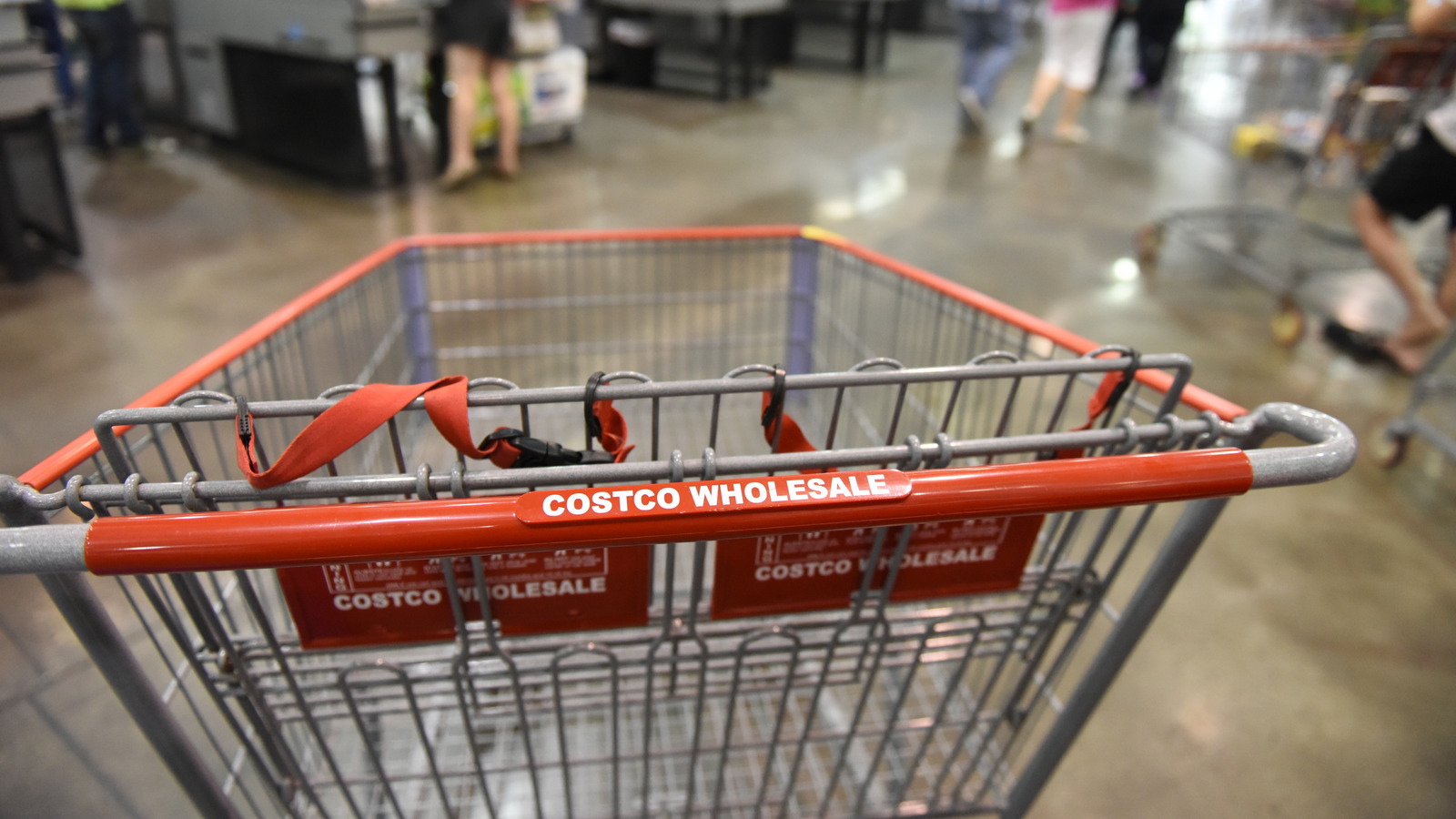Ah, Costco. The world’s hyper-consumerism paradise. Though it’s hard not to smile about your dangerously inexpensive $1.50 hot dog and soda combo or a giant bag of avocados that could produce enough guacamole to feed a small army, the warehouse club has been embroiled in some rather nefarious situations in several noteworthy instances. And these scandals might just have you thinking twice about the super-sized products you regularly snag off of Costco’s shelves.
Throughout the retailer’s roughly four decades of being in business, Costco’s major scandals have involved everyone from the customers to the employees to the folks caught up somewhere along the supply chain. Whether you’re a die-hard Costco fan curious to learn about its dark underbelly, a hater hoping to validate your lack of membership, or a budget-conscious consumer looking to justify canceling yours, you’re sure to uncover some dirt on the bulk superstore. So, let’s dig in.
1. Costco’s shrimp was connected to slave labor
Costco came under fire in 2015 when a California woman sued the warehouse club for its shrimps’ connection to slave labor. Costco sourced farmed prawns in Thailand that were raised on a diet of low-grade fish, which the lawsuit alleged was harvested with slave labor. Under California state laws, the lawsuit claimed that Costco had a duty to be transparent about the human rights violations in its supply chain.
The lawsuit was dismissed in 2016 when it was revealed that the woman who brought the suit against Costco didn’t actually purchase any of the shrimp impacted by forced, unpaid labor. After all, the warehouse club has data on all of its members. A new plaintiff was brought on and the lawsuit continued, but it was dismissed again in 2017. This time, a federal judge decided the plaintiffs weren’t able to prove that it was Costco’s responsibility to acknowledge the slave labor in its supply chain on the shrimps’ packaging.
Though Costco came out on top, research from a group of non-governmental organizations in 2024 found that Vietnamese, Indonesian, and Indian shrimp farms were exploiting workers in order to meet the demands of international supermarket chains, including Costco.
2. Pharmacy execs took part in a kickback scheme in Canada
Two Costco Pharmacy executives got caught up in some shady Canadian business dealings that came to a head in 2016. The Ontario College of Pharmacists accused Costco Pharmacy directors Joseph Hanna and Lawrence Varga of accepting illegal rebates from drug companies in exchange for stocking their products, a practice that is banned under Ontario law.
The situation came to light in 2015 after a sales representative from drug company Ranbaxy filed a complaint when Costco Pharmacy requested a roughly $1.3 million kickback. After investigating the situation, the Ontario College of Pharmacists said they found ample evidence to refer Hanna and Varga to a disciplinary panel for professional misconduct. In 2018, they both pleaded guilty.
The Ontario Ministry of Health and Long-Term Care also launched its own investigation in order to ensure Costco was complying with regulations like the Ontario Drug Benefit Act. In 2019, Ontario’s government fined Costco a whopping $7.2 million for accepting those unlawful kickbacks.
3. Costco Pharmacy improperly filled prescriptions
In 2017, Costco had to shell out $11.75 million in order to settle claims from the U.S. federal government that the warehouse club wasn’t filling prescriptions in accordance with the Controlled Substances Act. Prosecutors claimed that the period of non-compliance stretched from 2012 until 2015.
During that time, Costco was accused of filling prescriptions classified as controlled substances without having a Drug Enforcement Administration number — a credential given to pharmacists and other medical practitioners permitting them to prescribe, dispense, or administer those drugs. Aside from the lack of DEA numbers, the government said Costco’s pharmacy records were inaccurate and the retailer was also filling prescriptions without all the proper information completed.
The situation became a big scandal for reasons beyond the slipshod pharmacy management: Prosecutors claimed the improperly filled prescriptions could have ended up on the black market, thus contributing to the country’s prescription drug abuse crisis. Though Costco had to open its wallet in order to put the controversy to rest, the warehouse club denied contributing to the crisis.
4. Some eggs came from a supplier with inhumane conditions
The Humane Society of the United States sounded the alarm in 2015 when an undercover investigation revealed that one of Costco’s egg suppliers — Hillandale Farms — was producing eggs in concerning conditions.
The Humane Society filed a complaint with the Federal Trade Commission, and another with the Food and Drug Administration, after video footage from a former Hillandale employee depicted chickens in cages so small the birds couldn’t spread their wings. Live birds were also forced to remain in the same cages as deceased chickens, and the floor of the facility was littered with broken eggs and dead chickens.
Nonetheless, both Costco and an outside inspector audited Hillandale Farms and found it to be compliant. Hillandale Farms pointed a finger at the former employee who captured the footage for the Humane Society, blaming them for the conditions depicted. Despite the footage, Costco continued sourcing eggs from Hillandale Farms, claiming to believe the inhumane conditions were an isolated incident. Since the scandal broke out a decade ago, Costco has made strides toward fulfilling its mission to transition toward cage-free eggs, which are actually a pretty big deal. As of September 2022, 97% of the wholesaler’s eggs are cage-free.
5. Costco sold fake Tiffany rings
On Valentine’s Day 2013, Tiffany & Co sued Costco for trademark violation and counterfeiting after the wholesaler sold what the jewelry company claimed were fake Tiffany engagement rings. The rings in Costco’s display cases were labeled as “Tiffany,” but weren’t directly from Tiffany & Co and didn’t come in those iconic blue boxes. Instead, Costco argued the word “Tiffany” wasn’t referencing Tiffany & Co, but the style of setting where the prongs don’t impede the view of the diamond or its brilliance. Over 3,300 Costco customers purchased the “Tiffany” engagement rings.
A jury trial found that Costco was liable for selling the rings in question, and Tiffany & Co won $21 million in 2017 as a result. But the contentious legal battle didn’t stop there. In 2020, an appeals court vacated the earlier judgment, noting that Tiffany didn’t actually prove that customers were legitimately confused by the “Tiffany” label on the Costco rings. The appeals court sent the case back down to the lower court, but rather than endure another trial, the companies finally settled the dispute in 2021. Though the details of that negotiation were never made public, Costco indicated that the settlement was resolved in a civil, cooperative fashion.
6. Discontinuing the fan-favorite Polish dog enraged customers
Customers weren’t thrilled when Costco gave up on its other food court hot dog, the Polish dog, in 2018. The controversy spread like wildfire across social media, spurring the #SaveThePolishDog campaign.
Costco made the cut to its American menu after deciding to start simplifying and implementing healthier options. The promise of new menu items didn’t appease customers, and even though the warehouse club promised that the $1.50 all-beef hot dog meal wouldn’t be going anywhere, outrage continued. #SaveThePolishDog was heard all the way at Costco’s corporate headquarters, prompting the wholesaler to dedicate an entire web page to justifying the elimination of the Polish dog, claiming that the decision was supported by the majority of Costco members.
At a shareholder meeting that same year, former Costco CEO Craig Jelinek mentioned items that would replace the Polish dog — one of which was the plant-based Al Pastor Salad. Customers didn’t take to the new offering, and the salad was ultimately taken off the menu as well.
7. The death of a Costco employee in Korea raised some questions about working conditions
In June 2023, another Costco scandal emerged when a 29-year-old employee at one of the warehouse club’s Korean locations died on the job. Located in the province of Gyeonggi, Hanam was in the midst of a heatwave, and employee Kim Dong-ho was tasked with moving shopping carts from the parking lot to the store’s entrance.
Kim would move more than 200 shopping carts per hour, sometimes walking over 26 kilometers (roughly 16 miles) during a single shift. The day he died was particularly hot, with highs reaching 33 degrees Celsius (about 91 degrees Fahrenheit). Toward the end of his shift, Kim was found collapsed in the parking lot. Though he was transported to a hospital, he ultimately died of heatstroke.
Korean safety standards mandate that employers must provide employees who work outdoors with shaded break areas. While Costco had an indoor lounge for employees, it was located on the fifth floor of the building; Kim worked on the first floor, and walking to and from the lounge would have taken up 10 minutes of his 15 minute break. Though Kim’s death was found to be an industrial accident in November 2023, the situation prompted scrutiny of Costco’s working conditions.
8. Costco faced major discrimination accusations
Costco found itself amidst scandal a few different times when employees accused the retail giant of discrimination. In 2007, a California court greenlit a class-action lawsuit brought on by more than 750 past and present female employees who were denied promotions to management positions. The number of plaintiffs ballooned to over 1,250 women, and Costco ended up settling for an eye-popping $8 million in 2014.
In 2024, Costco had to shell out another $2 million after longtime Costco pharmacist Stuart Nover sued the wholesale club for wrongful termination based on age. Nover had worked for Costco for over two decades, and was 77 at the time of the suit.
Costco was in the center of yet another discrimination lawsuit in 2024, this time brought on by Andrew McClain, who was first hired at the Costco in Bolingbrook, Illinois, in 2017. During his tenure with the wholesale club, he claimed he was the target of racial discrimination. But Costco emerged the winner in that case, as a judge ruled that McClain wasn’t able to demonstrate that the harassment he was subjected to was due to his race.
9. Customers’ health data was compromised
Costco once again entered the spotlight in 2023 when it was caught up in a lawsuit accusing the retailer of sharing customers’ health data with Meta. The warehouse club allegedly used Meta Pixel — a piece of code that can be embedded into websites to track visitor activity — on its pharmacy website, effectively allowing Meta to access customers’ private personal and health information.
Through the Costco Pharmacy website, customers can take actions like scheduling immunizations, viewing their prescriptions, requesting refills, and having the prescriptions shipped to their home address. Thanks to Costco’s use of Meta Pixel, the lawsuit claims that information about prescriptions, vaccines, treatments, and even customers’ locations, health insurance providers, and their computer IP addresses were compromised. All of the data gathered was then allegedly used for targeted marketing by Meta.
The lawsuit claims that through this use of Meta Pixel, Costco violated the federal Health Insurance Portability and Accountability Act and other state privacy laws. But since the lawsuit was filed nearly two years ago, there hasn’t been much movement on the case.
10. Deceptive advertising led to some sticky situations
Aside from some of Costco’s seafood offerings being a textural nightmare, the wholesale club has also faced scrutiny for deceiving customers with its seafood advertising. In 2023, Costco was hit with a fine from the Australian government after one of its locations in Casuarina, Western Australia, falsely claimed that its lobsters were sourced locally. The lobsters were actually imported from Canada, and the Australian Competition and Consumer Commission slapped the retailer with a $33,000 AUD penalty for deceiving customers.
Earlier that year, Costco found itself in hot water when it came to its canned tuna, which the wholesale club claimed to be “dolphin safe.” The use of that phrase spurred a lawsuit when a judge ruled that allegations that Costco’s harvesting of tuna actually harmed or killed dolphins were plausible.
If that wasn’t enough, the retail giant faced two other lawsuits stemming from deceptive advertising. One related to Costco’s flushable wipes, which ended up damaging customers’ plumbing and costing the wholesale club $2 million to settle the lawsuit in 2024. That same year, Costco was at the center of another lawsuit claiming it sold baby wipes that were chock-full of PFAS, harmful synthetic “forever” chemicals.





